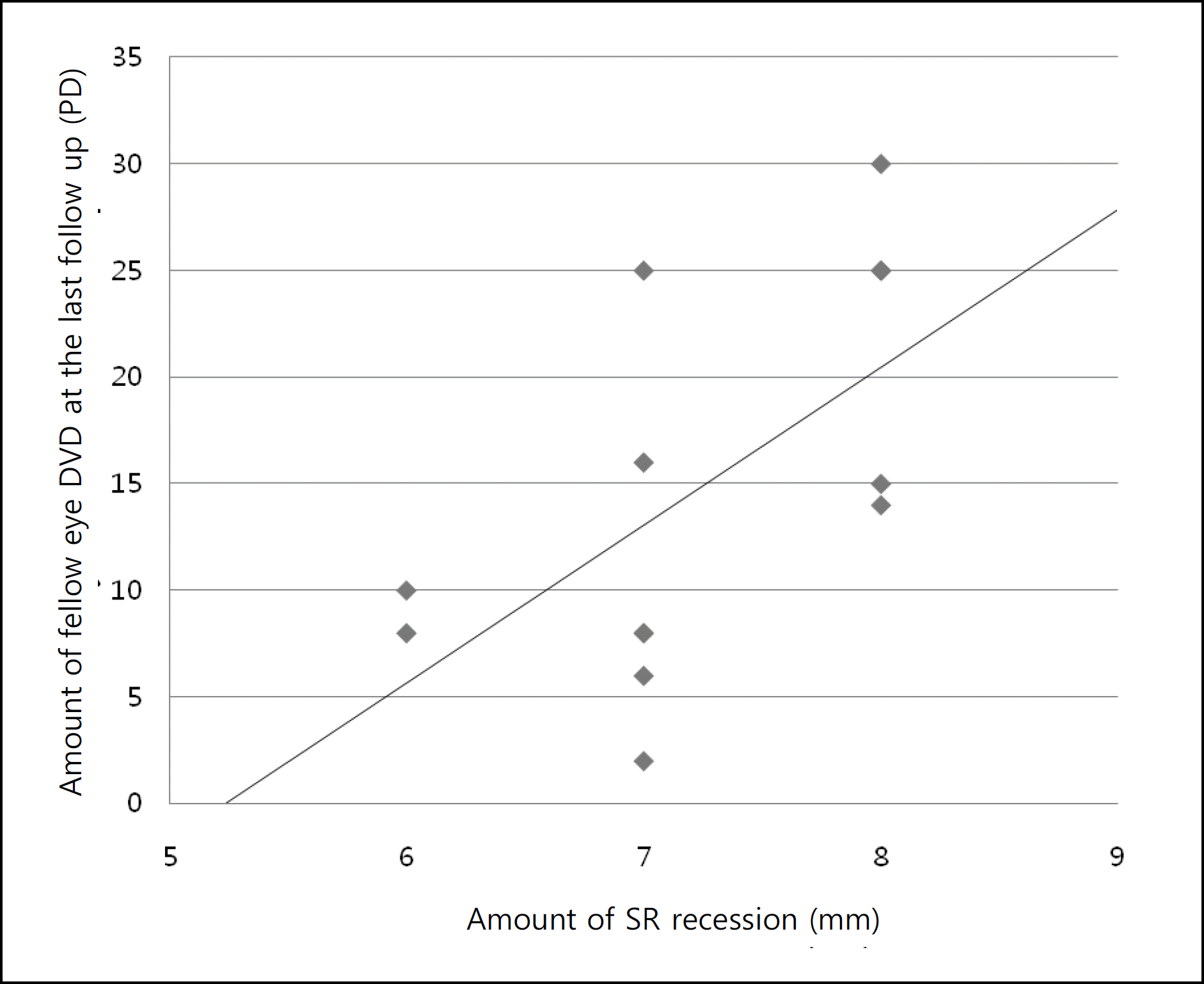Abstract
Purpose
This study analyzed the outcome of unilateral superior rectus recession in patients with asymmetrical dissociated vertical deviation (DVD) in terms of effectiveness and influence on the fellow eye.
Methods
Medical records of 40 patients (40 eyes) who had undergone unilateral superior rectus recession for the treatment of asymmetrical DVD were retrospectively reviewed from February 1993 to March 2009. The minimum follow-up period was 1 year after the operation.
Results
The overall success rate in the operated eye was 97.5% at 12 months and 90% at the last follow-up. However, a DVD larger than 10 PD developed in the fellow eye in 20% (8) of the patients. In patients who preoperatively had DVD in their fellow eyes, 50% developed DVD postoperatively in their fellow eyes. In patients who preoperatively did not have DVD in their fellow eyes, 14.7% developed DVD postoperatively in their fellow eyes. Furthermore, the angle of the DVD in the fellow eye increased with the surgical dosage.
Conclusions
Unilateral SR recession is effective in patients with asymmetrical DVD. However, a high incidence rate of DVD in the fellow eye should be considered, especially when preoperatively there is a small DVD in the fellow eye or a large DVD angle in the operated eye, whenever monocular superior rectus recession surgery is performed.
Go to : 
References
1. Duncan LB, von Noorden GK. Surgical results in dissociated abdominal deviations. J Pediatr Ophthalmol Strabismus. 1984; 21:25–7.
2. Rosenbaum AL, Santiago AP. Clinical strabismus management: principles and surgical techniques. Philadelphia: Saunders;1999. xv:p. 569.
3. Plager DA, Buckley EG. Strabismus surgery: basic and advanced strategies. Oxford; New York: Oxford University Press in cooperation with the American Academy of Opthalmology. 2004; xiv:194.
4. Parks MM. Ocular motility and strabismus. Hagerstown, Md.: Medical Dept., Harper & Row;1975. viii:p. 186.
5. Kii T, Ogasawara K, Ohba M, et al. [The effectiveness of the Faden operation on the superior rectus muscle combined with recession of the muscle for the treatment of dissociated vertical deviation]. Nihon Ganka Gakkai Zasshi. 1994; 98:98–102.
6. Lorenz B, Raab I, Boergen KP. Dissociated vertical deviation: what is the most effective surgical approach? J Pediatr Ophthalmol Strabismus. 1992; 29:21–9.

7. Freeman RS, Rosenbaum AL. Residual incomitant DVD following large bilateral superior rectus recession. J Pediatr Ophthalmol Strabismus. 1989; 26:76–80.

8. Magoon E, Cruciger M, Jampolsky A. Dissociated vertical deviation: an asymmetric condition treated with large bilateral superior rectus recession. J Pediatr Ophthalmol Strabismus. 1982; 19:152–6.

9. Schwartz T, Scott W. Unilateral superior rectus recession for the treatment of dissociated vertical deviation. J Pediatr Ophthalmol Strabismus. 1991; 28:219–22.

11. Scott WE, Sutton VJ, Thalacker JA. Superior rectus recessions for dissociated vertical deviation. Ophthalmology. 1982; 89:317–22.

12. Esswein MB, von Noorden GK, Coburn A. Comparison of surgical methods in the treatment of dissociated vertical deviation. Am J Ophthalmol. 1992; 113:287–90.

13. Von Noorden GK. Binocular vision and ocular motility: theory and management of strabismus. 5th ed.St. Louis: Mosby;1996. xviii:p. 605.
14. Guyton DL, Cheeseman EW Jr, Ellis FJ, et al. Dissociated vertical deviation: an exaggerated normal eye movement used to damp cy-clovertical latent nystagmus. Trans Am Ophthalmol Soc. 1998; 96:389–424. discussion 424–9.
15. Guyton DL. Dissociated vertical deviation: etiology, mechanism, and associated phenomena. Costenbader Lecture. J AAPOS. 2000; 4:131–44.
16. Brodsky MC. Dissociated vertical divergence: perceptual abdominal of the human dorsal light reflex. Arch Ophthalmol. 2002; 120:1174–8.
17. Mallette R, Repka M, Guyton D. Superior rectus suspension-abdominal for dissociated vertical deviation: a report of 59 operation. Binocular Vision. 1987; 2:209–15.
18. Hong JH, Kim MM. The effect of unilateral and bilateral superior rectus recession for dissociated vertical deviation(DVD). J Korean Ophthalmol Soc. 2001; 42:329–34.
19. Park SW, Jeong TS. The effect of unilateral surgery in dissociated vertical deviation. J Korean Ophthalmol Soc. 2006; 47:960–5.
Go to : 
 | Figure 1.Relationship between the amount of superior rectus recession and the amount of DVD in the fellow eye at the last follow-up (r = 0.419, p = 0.007). DVD = dissociated vertical deviation; PD = prism diopters; SR = superior rectus. |
Table 1.
Demographics of patients undergoing unilateral superior rectus recession
| Characteristic | Values |
|---|---|
| Number of patients | 40 |
| Gender (M:F) | 20:20 |
| Age at initial diagnosis (yrs) | 7.6 ± 9.0 (0–41) |
| Age at surgery (yrs) | 11.2 ± 8.9 (4–42) |
| Follow-up period (mons) | 49.1 ± 40.0 (12–170) |
Table 2.
Preoperative deviation angle
| DVD (PD) | No. of patients (%) |
|---|---|
| <10 | 3 (7.5) |
| 10–14 | 12 (30.0) |
| 15–19 | 7 (17.5) |
| 20–25 | 15 (37.5) |
| >25 | 3 (7.5) |
| Total | 40 (100) |
Table 3.
Surgical dosage table for patients with dissociated vertical deviation
| DVD (PD) | SR recession (mm) |
|---|---|
| <10 | 5 |
| 10–14 | 6 |
| 15–19 | 7 |
| 20–25 | 8 |
| >25 | 9 |
Table 4.
Postoperative results of DVD in the operated eye
| Postoperative DVD (PD) | No. of patients at 1 year (%) | No. of patients at the last F/U (%) |
|---|---|---|
| 0–4 | 35 (87.5) | 29 (72.5) |
| 5–9 | 4 (10) | 7 (17.5) |
| 10–14 | 0 (0) | 3 (7.5) |
| ≥15 | 1 (2.5) | 1 (2.5) |
Table 5.
Postoperative results of DVD in the fellow eye
| Fellow eye DVD (PD) | No. of patients at 1 year (%) | No. of patients at the last F/U (%) |
|---|---|---|
| ≤4 | 1 (2.5) | 1 (2.5) |
| 5–9 | 5 (12.5) | 4 (10) |
| 10–14 | 3 (7.5) | 2 (5) |
| ≥15 | 4 (10) | 6 (15) |
Table 6.
Postoperative results of patients who had DVD in the fellow eye preoperatively




 PDF
PDF ePub
ePub Citation
Citation Print
Print


 XML Download
XML Download